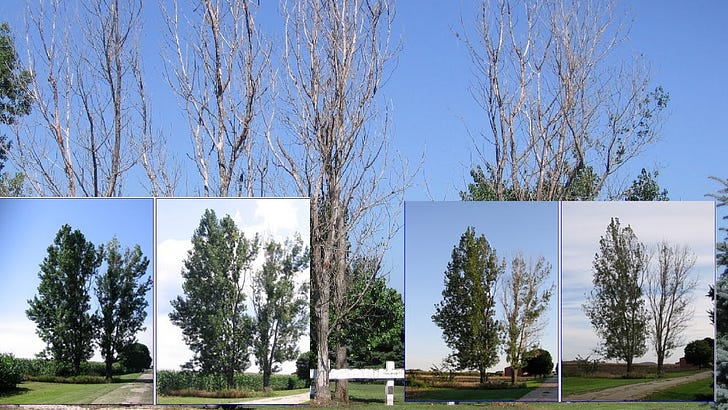In Memoriam, with Gratitude: London's Dr. Andrew Goldsworthy; Ireland EMF News Curator John Weigel
Deepest condolences to the families of Dr. Andrew Goldsworthy and John Weigel
Dr. Andrew Goldsworthy
Radiation Research: Andrew Goldsworthy BSc, PhD Andrew Goldsworthy is an Honorary Lecturer in Biology at Imperial College London. He retired from full time teaching in 2004 but still gives occasional lectures there in specialist subjects such as food irradiation and the (exorbitant) energy cost of modern food production. He was born just before the Second World War and, after a grammar school education in Wales, obtained a First Class Honours Degree in Botany, followed by a PhD at the University College of Swansea. He then took a lecturing post at Imperial College London where, apart from a short secondment to work in agricultural research and a sabbatical in the USA, he has been ever since. At Imperial, he acquired a reputation among students for explaining complex subjects in simple terms, for ‘out of the box’ thinking, and for spicing his courses with unusual lectures such as those on space biology and the scientific basis of acupuncture. His research and teaching, extend from the physiology and biochemistry of photosynthesis and photorespiration through the biological effects of electromagnetically treated water to the electrophysiology of plants. He also designed an experiment for the Anglo-Russian ‘Juno’ space mission and is now a member of the Life Sciences Advisory Group for the European Space Agency. As well as ‘regular’ scientific papers, mainly on plant electrophysiology, he has written several popular science feature articles for the New Scientist on such diverse subjects as ‘Why Trees are Green’ and ‘The Cell Electric’ (on the evolution of plant and animal action potentials and the origin of the nervous system). His interest in the biological effects of electromagnetic fields dates back over 30 years but has only recently come to fruition with the publication of a new theory that explains many of their seemingly weird effects in simple physico-chemical terms. It was first published (mainly in relation to plants) in Plant Electrophysiology – Theory and Methods, Ed AG Volkov (Springer 2006). This was followed by an Internet publication in 2007 (which can be viewed on this site) entitled ‘The Biological Effects of Weak Electromagnetic Fields’, which deals with their effects on humans and animals and, in particular, the dangers from mobile phones. The article also includes a section that draws attention to the remarkable similarity between the symptoms of electrosensitivity and those of hypocalcemia (low blood calcium). This is interpreted as being due to both electromagnetic fields and low blood calcium removing structural calcium from cell membranes to produce similar physiological effects. It is argued that electrosensitive individuals may already have a slightly low level of calcium in their bloodstream so that electromagnetic exposure ‘pushes them over the edge’ and they develop hypocalcemia symptoms. If this is correct, it raises the possibility that conventional treatments for hypocalcemia may remove some if not all of the symptoms of electrosensitivity. - Radiation Research: Andrew Goldsworthy BSc, PhD (more at link)
Andrew Goldsworthy ~ Tree damage: Effects of Electromagnetic Stress in Trees ~ 2011 10 minute video:
Collection of links to websites, scientific PDF files, articles, photos and videos: 22. Tree Damage | Multerland https://multerland.wordpress.com/emf-...
Transcript of the video: http://www.puls-schlag.org/download/G...
The video is part of a symposium, that took place in "het Groene Paviljoen", Baarn, the Netherlands, in 2011. Articles and videos about this symposium are also to be found in the collection. https://multerland.wordpress.com/emf-...
https://stopsmartmeters.org/wp-content/uploads/2012/04/BiologicalEffects_AndrewGoldsworthy_Mar2012.pdf
From Electromagnetic Health: Autism Risk from EMF Exposure Even Greater Problem Than Cancer Risk, says Andrew Goldsworthy BSc, PhD, retired biologist with Imperial College, London 28.05.2011
As scientists debate the risks of cancer from RF exposure in cell phones and wireless technologies this week at WHO’s International Agency for Research on Cancer (IARC), Andrew Goldsworthy, BSc, PhD cautions that the risk for autism from electromagnetic fields may be an even more important problem than the well-documented risk for cancers from cell phones.
In the essay, “How Electromagnetically Induced Cell Leakage May Cause Autism”, Dr. Goldsworthy explains the potential mechanism for autism from exposure to ambient Wi-Fi.
“…Weak electromagnetic fields can have a greater effect than strong ones and thus prolonged exposure to weak fields (where cells are maintained in the unstable condition for longer) is potentially more damaging than relatively brief exposure to much stronger ones”.
He says that a deficiency in the dedicated hard-wired neural networks needed for efficient communication with others result from early exposure to electromagnetic fields.
“A useful homology might be in the socialisation of dogs. If puppies do not meet and interact with other dogs within the first four months of their life (equivalent to about two human years), they too develop autistic behaviour. They become withdrawn, afraid of other dogs and strangers, and are incapable of normal “pack” behaviour. Once this four-month window has passed, the effect seems to be irreversible (just like autism). If this homology is correct, it suggests that experiments on dogs could hold the key to the investigation of autism and its possible links with electromagnetic exposure.”
Andrew Goldsworthy's research works | Imperial College London and other places
John Weigel
John and I had a similar calling. He informally compiled and emailed a broad range of international news stories to interested readers.
Death Notice of John WEIGEL (Dublin) | rip.ie
It is with great sadness, that we announce the death of John Weigel, Leixlip, Co. Kildare formerly of Chicago, Illinois. John passed away following a short illness. A kind-hearted gentleman who will be remembered for his intellectual mind and great sense of humour.
Olle Johansson wrote:






